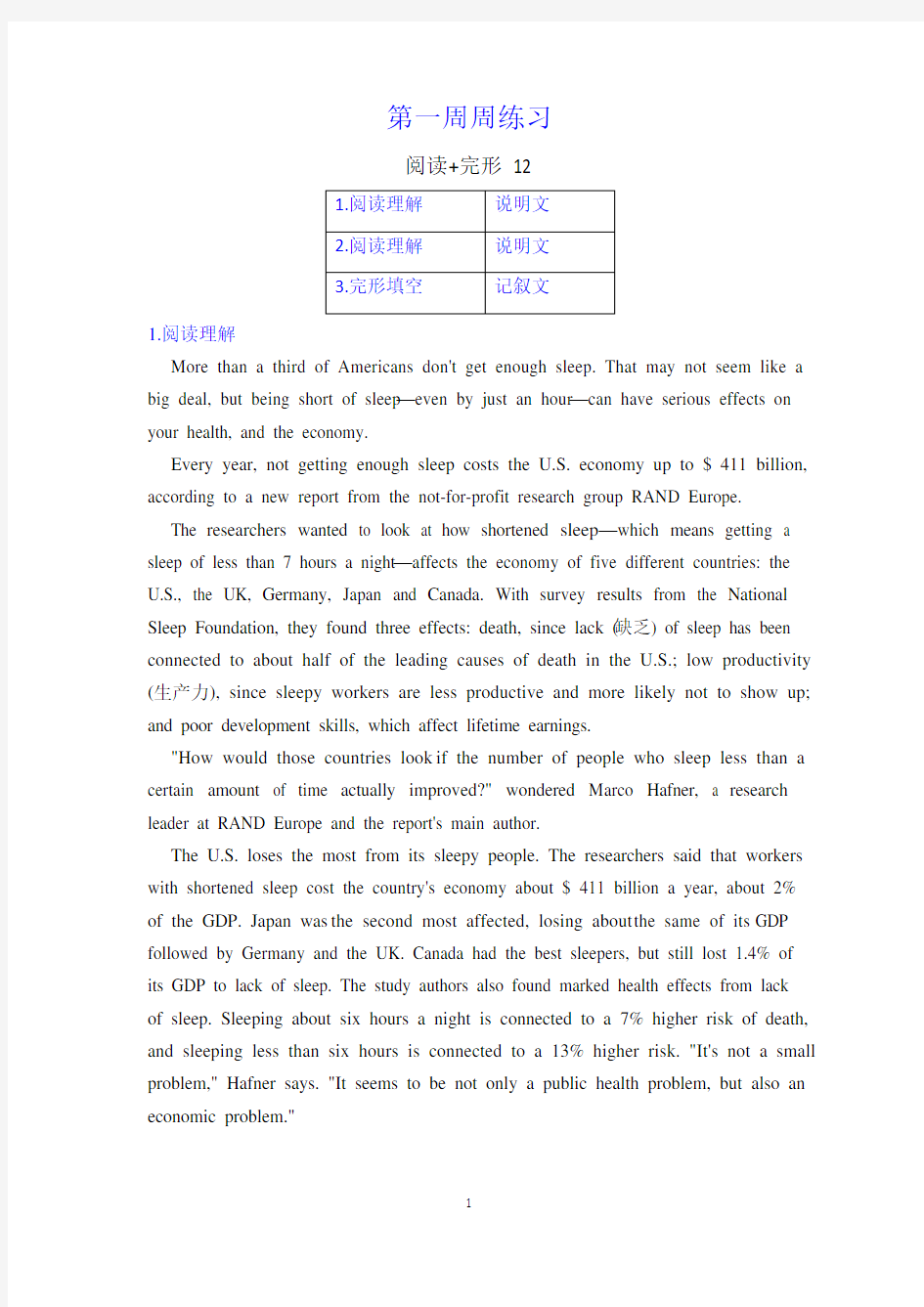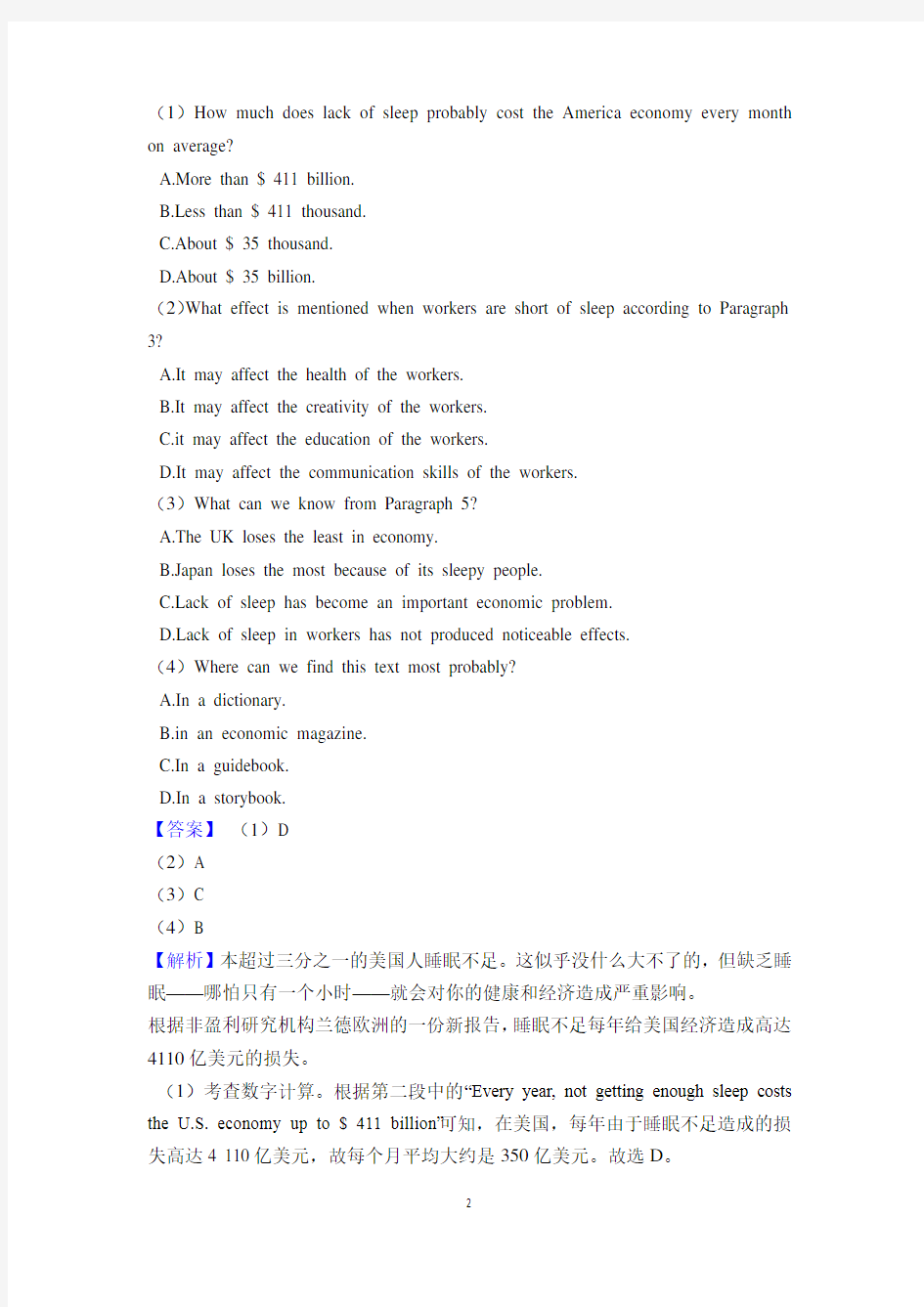高三英语第一周周练-阅读+完形 12(解析版)


第一周周练习
阅读+完形12
1.阅读理解
More than a third of Americans don't get enough sleep. That may not seem like a big deal, but being short of sleep—even by just an hour—can have serious effects on your health, and the economy.
Every year, not getting enough sleep costs the U.S. economy up to $ 411 billion, according to a new report from the not-for-profit research group RAND Europe.
The researchers wanted to look at how shortened sleep—which means getting a sleep of less than 7 hours a night—affects the economy of five different countries: the U.S., the UK, Germany, Japan and Canada. With survey results from the National Sleep Foundation, they found three effects: death, since lack (缺乏) of sleep has been connected to about half of the leading causes of death in the U.S.; low productivity (生产力), since sleepy workers are less productive and more likely not to show up; and poor development skills, which affect lifetime earnings.
"How would those countries look if the number of people who sleep less than a certain amount of time actually improved?" wondered Marco Hafner, a research leader at RAND Europe and the report's main author.
The U.S. loses the most from its sleepy people. The researchers said that workers with shortened sleep cost the country's economy about $ 411 billion a year, about 2% of the GDP. Japan was the second most affected, losing about the same of its GDP followed by Germany and the UK. Canada had the best sleepers, but still lost 1.4% of its GDP to lack of sleep. The study authors also found marked health effects from lack of sleep. Sleeping about six hours a night is connected to a 7% higher risk of death, and sleeping less than six hours is connected to a 13% higher risk. "It's not a small problem," Hafner says. "It seems to be not only a public health problem, but also an economic problem."
(1)How much does lack of sleep probably cost the America economy every month on average?
A.More than $ 411 billion.
B.Less than $ 411 thousand.
C.About $ 35 thousand.
D.About $ 35 billion.
(2)What effect is mentioned when workers are short of sleep according to Paragraph 3?
A.It may affect the health of the workers.
B.It may affect the creativity of the workers.
C.it may affect the education of the workers.
D.It may affect the communication skills of the workers.
(3)What can we know from Paragraph 5?
A.The UK loses the least in economy.
B.Japan loses the most because of its sleepy people.
https://www.360docs.net/doc/5811709897.html,ck of sleep has become an important economic problem.
https://www.360docs.net/doc/5811709897.html,ck of sleep in workers has not produced noticeable effects.
(4)Where can we find this text most probably?
A.In a dictionary.
B.in an economic magazine.
C.In a guidebook.
D.In a storybook.
【答案】(1)D
(2)A
(3)C
(4)B
【解析】本超过三分之一的美国人睡眠不足。这似乎没什么大不了的,但缺乏睡眠——哪怕只有一个小时——就会对你的健康和经济造成严重影响。
根据非盈利研究机构兰德欧洲的一份新报告,睡眠不足每年给美国经济造成高达4110亿美元的损失。
(1)考查数字计算。根据第二段中的“Every year, not getting enough sleep costs the U.S. economy up to $ 411 billion”可知,在美国,每年由于睡眠不足造成的损失高达4 110亿美元,故每个月平均大约是350亿美元。故选D。
(2)考查细节理解。第三段讲了睡眠不足造成的三个影响:第一个是死亡,第二个是生产力低下,第三个是发展技能欠佳。故选A。
(3)考查细节理解。根据第五段中的“It's not a small problem… but also an economic problem”可知,睡眠不是小问题,它已经成了一个经济问题,故选C。(4)考查推理判断。本文讲了睡眠不足除了会带来健康问题外,还会带来经济问题。所以本文最有可能出现在经济类杂志上。故选B。
【总结】本题考点涉及细节理解,数字计算和推理判断三个题型的考查,是一篇经济类阅读,考生需要准确掌握细节信息,并根据上下文的逻辑关系,进行推理,计算,从而选出正确答案。
2.阅读理解
If you've ever travelled with other people, the chances are you've had to make compromises. When you want to get up early to watch the sunrise, for example, your friends may argue that getting enough sleep is more important. And when you want to try the different food, your friends might say it looks strange and push you to a Chinese restaurant instead.
This is probably why more people these days are choosing to travel alone. According to reports on holiday habits from the Association of British Travel Agents, the percentage of people in the UK who take trips alone has been increasing, from 6 percent in 2011, to 12 percent in 2017, and to 15 percent in 2018. Most of these people said they choose to travel alone because this allows them to "do what they want".
In fact, travelling alone is only a part of a recent trend (趋势) of people wanting to take more time alone—or what's called "me time". "Imagine yourself as a full pot of water and everything else that asks for your attention is an empty glass. When you provide what is needed for them you are using up your own water supply," Editor Nicole Lyons wrote for the mental health social network Psych Central. “But how are you ref illing your pot? This is where your ‘me time' comes in."
However, it's still quite a common belief that those who do things alone are losers and that they're alone simply because they don't have anybody to be with. But why can't people just be enough for themselves?
The now Duchess of Sussex Rachel Meghan Markle once wrote on her blog in 2016 about how she enjoyed taking herself out to dinner and travelling alone. "It's not easy. But it's important," she wrote. You should face everything and encourage
yourself to move forward when the feeling of loneliness and boredom sweeps through your body and mind, according to Markle.
(1)What does the underlined phrase "make compromises" probably mean in Paragraph 1?
A.Turn up.
B.Work hard.
C.Give in.
D.Take care.
(2)Why do some people choose to travel alone?
A.To save more money.
B.To enjoy their freedom.
C.To calm themselves down.
D.To avoid troubling someone.
(3)What does the author intend to do in Paragraph 3?
A.Explain why we need "me time".
B.List some examples of "me time".
C.Provide some advice for readers.
D.Add some background information.
(4)What is the best title of the text?
A.A new way of travelling abroad
B.Me time: enjoy yourself alone
C.The disadvantages of travelling alone
D.How to find a proper partner in trips
【答案】(1)C
(2)B
(3)A
(4)B
【解析】本文是一篇说明文,介绍了一种日渐盛行的现象——独自旅行,以及这种现象背后更深层的人文原因,和社会上对这种现象不同的看法。
(1)考查词义猜测。根据第一段中的“When you want to get up early to watch the sunrise, for example, your friends m ay argue that… push you to a Chinese restaurant instead”可知,当你想早起看日出时,你的朋友却想睡觉;当你想尝试不同的食物时,你的朋友却想让你去中餐馆,所以很可能你不得不妥协,故选C。
(2)考查细节理解。根据第二段中的“Most of these people said they choose to travel alone because this allows them to 'do what they want'”可知,大多数人选择独自旅行是为了能够做他们想做的事,即享受他们的自由,故选B。
(3)考查推理判断。通读本段内容可知,本段主要解释了为什么我们需要“me time”,故选A。
(4)考查主旨大意。通读全文可知,本文主要介绍最新兴起的一种趋势“me time”,即为了避免和别人在一起的不便与麻烦,很多人选择独自一人旅行,去做自己想做的事,故选B。
【总结】本题考点涉及细节理解,词义猜测,推理判断和主旨大意四个题型的考查,是一篇社会现象类阅读,要求考生在捕捉细节信息的基础上,进一步根据上下文的逻辑关系,进行分析,推理,概括和归纳,从而选出正确答案。
3.阅读下面短文,从短文后各题所给的A、B、C和D四个选项中,选出可以填入空白处的最佳选项。
I was worried about the big math test. "It's just so 1 "I whined (抱怨) to my mother. "You, Dad, and Tyler hardly have to work at all to understand math, and meanwhile I 2 for hours to figure out every new concept." "Sometimes things that are worth 3 take time, Honey," she responded.
The next day in Language Arts class, when the teacher wrote "Energy and persistence conquer(征服) all things" on the board, it felt like old Ben Franklin was speaking 4 to me. "Energy and persistence," I muttered. "I'll study very day until that math test, and I'll be 5 to conquer it."
The next three weeks were 6 , to say the least. Once1 made my plan to spend time 7 everyone wanted me for some new and 8 activity. Each time 9 an invitation, I gritted my teeth(咬紧牙关) and 10 a math test paper with a big A+on it. Happily for me, I got plenty of 11 from various sources. When I showed my study plan to my math teacher, she was 12 . At home, my brother was also happy to lend a hand.
When the day of the math exam finally arrived, I was 13 worried. But I knew I had done 14 I could. I would love to say that I came home a week later with a big A+ on my exam paper. It did not happen that way. This story did have a 15 ending, though. When I
came home with a B on my test, my parents took turns to 16 me. "You knew the test would be 17 , but you didn't back down," said my father. "You earned that 18 ! Perfect grades are nice, 19 we care more about you working hard and learning. We're proud of you."
So I guess Ben Franklin was right! I didn't get an A+, but with energy and persistence, I definitely conquered what I thought would be the 20 math test.
1. A. upsetting B. embarrassing C. funny D. silly
2. A. examine B. struggle C. pray D. hesitate
3. A. arguing B. considering C. reciting D. learning
4. A. casually B. honestly C. directly D. politely
5. A. sure B. afraid C. curious D. anxious
6. A. boring B. exciting C. challenging D. satisfying
7. A. reading B. thinking C. studying D. writing
8. A. interesting B. dangerous C. private D. violent
9. A. assessed B. confirmed C. longed for D. turned down
10. A. pictured B. checked C. held D. collected
11. A. money B. support C. praise D. reward
12. A. confused B. encouraged C. annoyed D. impressed
13. A. almost B. just C. ever D. still
14. A. everything B. nothing C. something D. anything
15. A. strange B. happy C. sad D. humorous
16. A. amuse B. teach C. hug D. consult
17. A. different B. tough C. special D. awful
18. A. title B. grade C. honor D. right
19. A. or B. because C. so D. but
20. A. impractical B. unfair C. impossible D. unfortunate
【答案】(1)A;(2)B;(3)D;(4)C;(5)A;(6)C;(7)C;(8)A;(9)D;(10)A;(11)B;(12)D;(13)D;(14)A;(15)B;(16)C;(17)B;(18)B;(19)D;(20)C;
【解析】本文是一篇记叙文,讲述了作者的数学不好,每天要花好几个小时弄明白新概念,后来作者下定决心要学好数学。作者为此制定了学习计划、拒绝了各种邀请和活动,也获得了老师和兄弟的支持,虽然作者最后数学考试得了B,但是作者凭借自己的能量和坚持,绝对战胜了认为不可能的数学考试。
(1)考查形容词。句意:“这太让人心烦了,”我向母亲抱怨道。A. upsetting“令人心烦的”;B. embarrassing“尴尬的”;C. funny“有趣的”;D. sill y“傻的”。根据上文“I was worried about the big math test.”可知作者在向母亲诉说自己的烦恼,自己的数学不好让作者心烦。故选A。
(2)考查动词。句意:你、爸爸和Tyler几乎不需要学习就能理解数学,而与此同时,我却花了好几个小时努力去理解每一个新概念。A. examine“检查”;B. struggle“努力,挣扎”;C. pray“祈祷”;D. hesitate“犹豫”。根据下文“for hours to figure out every new concept.”可知此处指作者每天好几个小时努力去理解新概念。struggle for固定短语“努力”。故选B。
(3)考查动词。句意:“宝贝,有时候值得学习的事情需要时间。”她回答道。
A. arguing“争论”;
B. considering“考虑”;
C. reciting“背诵”;
D. learning“学习”。根据上文“to figure out every new concept.”可知作者的母亲告诉作者数学这种值得学习的事情是需要时间的。故选D。
(4)考查副词。句意:我感觉就像老Ben Franklin在直接对我说话。A. casually“随便地”;B. honestly“诚实地”;C. directly“直接地”;D. politely“礼貌地”。根据上文“‘Energy and persistence conquer all things’ on the board, it felt like old Ben Franklin was speaking”可知,作者感觉黑板上写下的话就像是老Ben Franklin直接对自己说的。其它选项不符合语境。故选C。
(5)考查形容词。句意:我每天都在学习,直到数学考试,我确信我一定会战胜它。A. sure“确信的”;B. afraid“害怕的”;C. curious“好奇的”;D. anxious“焦虑的”。根据下文“to conquer it.”可知作者每天都学习数学,确信自己可以克服它。be sure to do sth.固定短语,“一定会做某事”。故选A。
(6)考查形容词。句意:至少可以说,接下来的三个星期充满了挑战。A. boring“无聊的”;B. exciting“激动的”;C. challenging“挑战的”;D. satisfying“令人满意”。根据上文可知作者下定决心要学习自己不擅长的科目数学,因此接下来的三个星期充满了挑战。故选C。
(7)考查动词。句意:一旦我制定了花时间学习的计划,每个人都想让我做一些新的和有趣的活动。A. reading“阅读”;B. thinking“思考”;C. studying“学习”;
D. writing“写”。第二段中“I'll study very day until that math test”可知作者决定花时
间学习。故选C。
(8)考查形容词。句意:一旦我制定了花时间学习的计划,每个人都想让我做一些新的和有趣的活动。A. interesting“有趣的”;B. dangerous“危险的”;C. private“私人的“;D. violent“暴力的”。根据上文可知此处指新的有趣的活动,对要学习的作者产生诱惑。故选A。
(9)考查动词。句意:每次拒绝邀请,我都会咬紧牙关,想象一张数学试卷上写着大大的A +。A. assessed“评估”;B. confirmed“确认”;C. longed for“渴望”;
D. turned down“拒绝,关小”。根据下文“I gritted my teeth”可推知作者拒绝了那些邀请,咬紧牙关学习。故选D。
(10)考查动词。句意:每次拒绝邀请,我都会咬紧牙关,想象一张数学试卷上写着大大的A +。A. pictured“想象,描绘”;B. checked“检查”;C. held“举行”;
D. collected“收集”。现在还没有数学考试,所以作者是在想象自己的试卷上写着大大的A+。故选A。
(11)考查名词。句意:幸运的是,我得到了各种支持。A. money“钱”;B. support“支持”;C. praise“赞扬”;D. reward“奖赏”。根据上文可推知作者很幸运地得到了各种支持。故选B。
(12)考查形容词。句意:当我向数学老师展示我的学习计划时,她印象深刻。
A. confused“困惑的”;
B. encouraged“受到鼓舞的”;
C. annoyed“恼怒的”;
D. impressed“印象深刻的”。根据上文“When I showed my study plan to my math teacher, ”可知此处指数学老师对作者学习计划的反应是印象深刻的,故选D。(13)考查副词。句意:当数学考试的日子终于到来的时候,我仍然很担心。
A. almost“差不多”;
B. just“只是”;
C. ever“曾经”;
D. still“仍然”。根据上文“I was worried about the big math test.”可知作者虽然努力学习了数学,但是仍然很担心。故选D。
(14)考查代词。句意:但我知道我已经做了我所能做的一切。A. everything“一切”;B. nothing“没有什么”;C. something“某事”;D. anything“任何事”。根据上文可知作者为了学习数学制定了学习计划,拒绝了各种邀请和活动,还从老师和兄弟那里获得了支持,因此作者做了自己所能做的一切事情。故选A。
(15)考查形容词。句意:不过,这个故事确实有一个快乐的结局。A. strange“奇怪的”;B. happy“幸福的,快乐的”;C. sad“悲伤的”;D. humorous“幽默的”。根据下文可知作者虽然数学考试得了B,但是父母都来拥抱自己,为作者感到骄傲,所以这个故事的结局是快乐的。故选B。
(16)考查动词。句意:当我考了个B回家时,我父母轮流拥抱我。A. amuse“娱
乐”;B. teach“教授”;C. hug“拥抱”;D. consult“咨询”。根据下文“We're proud of you.”可知父母为作者感到骄傲,所以是拥抱了作者。故选C。
(17)考查形容词。句意:“你知道考试很难,但你没有放弃。”父亲说。A. different“不同的”;B. tough“艰难的”;C. special“特别的”;D. awful“糟糕的”。根据上文可知作者学习数学有困难,因此作者知道考试会很难,但没有放弃。故选B。
(18)考查名词。句意:这是你应得的分数!A. title“标题”;B. grade“分数,成绩”;C. honor“荣誉”;D. right“权利”。根据下文“Perfect grades are nice”可知此处指分数。故选B。
(19)考查连词。句意:完美的成绩固然好,但我们更关心你的努力学习。A. or“或者”;B. because“因为”;C. so“所以”;D. but“但是”。根据语境可知为转折关系,应用but。故选D。
(20)考查形容词。句意:我没有拿到A+,但是凭借我的能量和坚持,我绝对战胜了我认为不可能的数学考试。A. impractical“不切实际的”;B. unfair“不公平的”;C. impossible“不可能的”;D. unfortunate“不幸的”。根据第一段“for hours to figure out every new concept.”可知作者一开始要花好几个小时才能弄明白新概念,所以一开始作者觉得数学考试是不可能成功的,如今作者得了B,说明自己战胜了认为不可能的数学考试。故选C。
【总结】本题考点涉及动词,名词,形容词,副词,代词,连词,固定短语等多个知识点的考查,是一篇故事类阅读,要求考生在理解细节信息的基础上,进一步根据上下文的逻辑关系,进行分析推理,从而选出正确答案。
